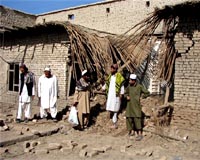| . |  |
. |
KABUL, March 19, 2011 () - Afghan President Hamid Karzai on Monday launches the transfer of responsibility for security from coalition to Afghan forces by announcing the first provinces and cities to be handed over. But with a major insurgency still raging, doubts remain over how ready the national security forces really are, with military leaders complaining of a lack of resources and analysts citing corruption and low retention rates. Afghan forces are due to begin taking control of security in certain areas in July, a crucial step on the road towards the eventual departure of the 140,000 foreign combat troops stationed in the war-torn country. On Monday, Karzai will mark the start of the Afghan new year by announcing up to four provinces and three major cities to be handed over this summer, the first phase of the long-awaited transition process. The move comes after battle-weary countries contributing to the NATO-led force agreed last year to begin putting the battlefield under his control, moving Western troops to a support role. NATO's International Security Assistance Force (ISAF) has been building up Afghan forces in the hope of handing them full command by 2014 and the national army now has more than 150,000 troops. The aim is to prevent the country from once again becoming a haven for Al-Qaeda militants. "In terms of numbers in the army and police force, we are making progress. In terms of having the right equipment, we still have a long way to go," independent analyst and former deputy foreign minister Mahmoud Saikal told AFP. "But the most important factor is motivation. The enemy hasn't been well defined -- one day Mr Karzai refers to them as the enemy, and the next he is calling them our dear brothers. "It appears the international coalition is focusing on numbers, but there is a risk we will have armed forces that are unmotivated to fight and a government that is unsure what to do with them." Western officials in Kabul say they expect the safer parts of Afghanistan will be the first to transition to Afghan forces. Most of the Taliban-led insurgency in Afghanistan is concentrated in the south and east, while the north and west are generally seen as safer despite some dangerous pockets created by militants in recent years. US President Barack Obama has said he wants American troops to begin leaving Afghanistan in July, amid waning domestic support for the war. Last year was the deadliest by far for international troops since the conflict began in 2001, and polls in many of the countries in the coalition fighting the Taliban show low levels of support for continued involvement. But alliance officials have stressed that the transition will be gradual and dependent on conditions on the ground, and only a small number of American soldiers are expected to leave Afghanistan this summer. NATO Secretary General Anders Fogh Rasmussen said last week that while the gradual "thinning out" of ISAF forces in particular provinces would accelerate, "redeployment and reinvestment... remains a NATO responsibility."
Share This Article With Planet Earth
Related Links News From Across The Stans
 Pakistan demands US apology for deadly drone strike
Pakistan demands US apology for deadly drone strikeIslamabad (AFP) March 18, 2011 Pakistan has strongly condemned a drone strike against a Taliban bastion in the northwest tribal region that killed 35 people and demanded an apology and explanation from United States. Civilians and police were among those killed Thursday when US missiles ploughed into a militant training compound in Datta Khel town, 40 kilometres (25 miles) west of Miranshah, the main town in tribal North ... read more |
|
| The content herein, unless otherwise known to be public domain, are Copyright 1995-2010 - SpaceDaily. AFP and UPI Wire Stories are copyright Agence France-Presse and United Press International. ESA Portal Reports are copyright European Space Agency. All NASA sourced material is public domain. Additional copyrights may apply in whole or part to other bona fide parties. Advertising does not imply endorsement,agreement or approval of any opinions, statements or information provided by SpaceDaily on any Web page published or hosted by SpaceDaily. Privacy Statement |